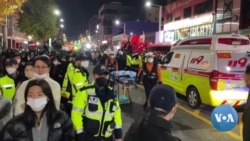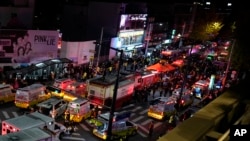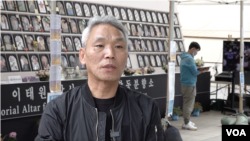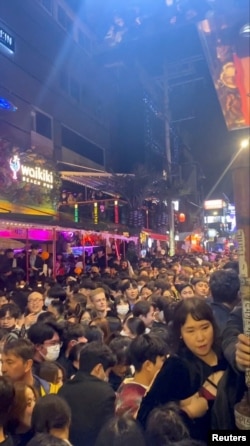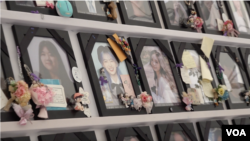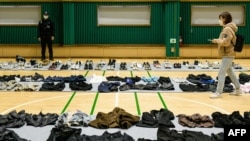It’s been nearly a year since Song Jin-young lost his daughter, 20-year-old Chae-rim, who was one of nearly 160 people crushed to death during a Halloween celebration in the South Korean capital's Itaewon neighborhood.
But as time passes, the pain only seems to get more intense, Song said, sitting in his daughter’s old room in the top level of a simple, two-story apartment in the central South Korean city of Daejeon.
Chae-rim's presence is everywhere here – her twin bed, makeup stand, and canvas brush paintings all remain in place, as do the clothing she was designing and selling on an online marketplace.
“We just aren’t prepared to make any changes to this space. I think we can only do that when we’re ready to let her go. But we just aren’t ready yet,” Song said.
It’s hard to heal, he added, without knowing basic details of Chae-rim’s death. Who, for instance, gave her first aid in her final moments? Could they have done more? And where, exactly, did she die?
A year later, he said he barely knows more than he did on the night of October 29, when he frantically called his daughter’s cell phone hundreds of times – for 12 hours – before eventually getting confirmation she was dead.
“I just want to have a clear idea of why this all happened,” Song said. “But I still have no idea.”
Like many relatives of those who died in Itaewon, Song hopes the one-year anniversary of the disaster will create greater pressure on the government to provide more answers and punish those responsible.
Government response
According to the results of an investigation released in January, police and other government agencies failed to prepare adequate crowd control measures for the estimated 130,000 partygoers that crammed into Itaewon, a popular nightlife district in central Seoul. Although 137 police officers were assigned to Itaewon that night, they were mainly focused on monitoring drug and other crimes.
The investigation also found that police ignored hotline calls by pedestrians who warned of a dangerous bottleneck in the narrow alleyway where the disaster occurred. The first calls were received nearly four hours before the first deaths were reported, according to transcripts released by police last November.
The investigation recommended charges against 23 officials – half of them police officers. So far, only six have been arrested, on charges related to negligence or tampering with the investigation. Their trials are in progress.
But many bereaved family members believe the government has only been willing to go after low- and mid-ranking police officers and other local officials, while shielding more senior authorities from punishment.
In February, South Korea's opposition-dominated National Assembly impeached Lee Sang-min, the interior and safety minister, saying he should accept responsibility.
Five months later, the Constitutional Court overturned the impeachment. The court ruled that no single person could be blamed for a tragedy that resulted from a failure that spanned multiple government agencies.
In a statement to VOA, the South Korean presidential office said President Yoon Suk Yeol "expressed on several occasions that he was ‘heartbroken and deeply sorry as president,’ and this remains unchanged."
"Our top priority is people’s lives and safety; the government will continue to assess the national safety system and make necessary improvements," the presidential office statement added.
Yoon’s office has previously accused his opponents of inappropriately using the Itaewon tragedy to try to politically damage his administration.
His ruling party opposes a pending bill in the country’s National Assembly that would launch a special investigation into the tragedy. Many Yoon allies fear such an investigation would be biased.
But many of those who lost family say the previous investigation was not thorough enough and did not come close to providing accountability for one of South Korea’s worst peacetime disasters.
The main group representing the victims' families – 10.29 Itaewon Disaster Bereaved Families and Survivors organization – has held periodic protests and vigils calling for a more complete probe.
“It is devastatingly frustrating that there has been no proper investigation,” said Jin Chang-hee, whose 21-year-old niece died in Itaewon. “We need proper support from the ruling party and we just don’t have it.”
How to move on
Jin spoke to VOA while sitting in a cafe in Daejeon, where a small group of bereaved family members assembled purple memorial ribbons while reminiscing about the victims.
“Doing this allows us to laugh while we think about the children. Our friendship becomes stronger. And we can relieve some of the tiredness that has accumulated from struggling for a year,” Jin said.
Song, Chae-rim’s father, sat across from Jin at the cafe. Spending time with other bereaved family members, he said, has played a crucial part in coping with the pain. But it feels impossible to fully move on without more justice, Song added.
“In the future,” he said, “I think those who are in positions of responsibility for preventing such disasters should actually take some responsibility.”




